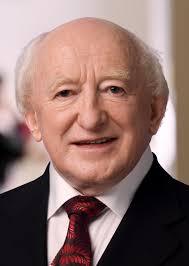Irish President Urges Systemic Reforms on Climate, Debt, and Food Insecurity in Africa
"The Global North is responsible for 92% of overshoot emissions, the damage caused by climate breakdown," President Higgins stated.

- Country:
- Ivory Coast
In a powerful address at the 2024 Kofi Annan Eminent Speakers Lecture, Irish President Michael D. Higgins urgently called for global collaboration to address the intertwined crises of climate change, rising debt, and escalating food insecurity in Africa. His remarks highlighted the disproportionate responsibility of the Global North in contributing to these crises and underscored the need for comprehensive reforms to support Africa's development and sustainability.
"The Global North is responsible for 92% of overshoot emissions, the damage caused by climate breakdown," President Higgins stated. "Yet, global south renewable energy is receiving 40 times less public finance than the fossil fuel sector." His words resonated deeply during the hybrid event, which was organized by the African Development Bank Group’s African Development Institute. Alongside President Higgins, the event featured Dr. Akinwumi A. Adesina, President of the African Development Bank Group, and Professor Kevin Chika Urama, the Bank's Chief Economist and Vice President for Economic Governance and Knowledge Management. The session was moderated by Victor Oladokun, Senior Advisor to the President for Communication and Stakeholder Engagement.
Dr Adesina emphasized the lasting influence of Kofi Annan, whose memory the lecture honours. “His understanding of international issues, particularly multilateralism and support for African farmers, continues to inspire millions,” he said. Annan’s dedication to sustainable development, food security, and the empowerment of smallholder farmers was a central theme throughout the event.
President Higgins elaborated on the escalating challenges Africa faces, particularly the crippling debt crisis. "In 2024 alone, Africa is expected to pay $163 billion in debt service, up from $61 billion in 2010," he said, warning that debt payments are now surpassing social spending by two-thirds in many African countries. This debt burden, Higgins noted, is contributing to widespread poverty and food insecurity. "As a result of the debt crisis, children are starving… the planet is burning, and extreme poverty is rising," he added.
The Irish President also highlighted the severe shortfall in climate finance, emphasizing that the contributions from the global North remain grossly insufficient. "Current contributions are not enough to mitigate the impacts of climate change on vulnerable countries," he stated, noting the urgent need for more substantial financial support for affected nations.
Turning to food insecurity, Higgins painted a bleak picture of global malnutrition. "Half of the world’s 8 billion people are malnourished, and more than 1 billion people in Africa cannot afford a healthy diet," he revealed. He also pointed to conflict as the primary driver of food insecurity, affecting 135 million people across 20 countries. "Conflict has become a central obstacle to achieving food security," he stressed.
Proposing solutions, Higgins called for sweeping systemic reform, particularly in debt relief frameworks, which he argued are currently ineffective. He suggested capping debt service at 15% of government revenue for countries not in capital markets, which could save sub-Saharan Africa at least $97 billion annually. These funds, he emphasized, could be redirected toward essential social and environmental programs.
Dr Adesina praised President Higgins for his decades of support for Africa’s development, noting his extensive work in the continent over more than 50 years. He also highlighted Ireland’s ongoing contributions, including €35 million for the African Development Fund’s 16th replenishment and €6 million for climate adaptation through the African Climate Change Fund. “Ireland’s partnership with the African Development Bank Group is invaluable, and their commitment to Africa is unwavering,” Adesina stated.
During a post-address discussion, President Higgins and Dr. Adesina discussed the potential of African smallholder farmers to thrive in global markets with the right support. They cited Malawi’s success story, where the country transitioned from being a food aid recipient to a food exporter after investing in farmer support programs. “Value addition is the gateway to wealth,” Dr. Adesina emphasized, underlining the importance of moving beyond raw commodity exports.
Professor Urama also weighed in on the importance of these discussions for Africa's future. “As we approach the halfway point in our journey toward sustainable development, it is crucial that we continue innovating and collaborating to empower future generations,” he said, stressing the need for bold solutions to Africa's challenges.
The Kofi Annan Eminent Speakers’ Lecture Series, which began in 2006, has hosted several notable figures, including former African presidents and Nobel Laureates. This year’s event once again underscored the urgent need for global solidarity and action to support Africa in overcoming its most pressing challenges.
In closing, President Higgins reiterated the critical importance of addressing Africa's debt, climate, and food security crises. "We must act now to create a sustainable, equitable future for Africa and for the world," he said, urging leaders to take concrete steps toward systemic change.
- READ MORE ON:
- Kofi Annan Eminent Speakers Lecture
- Michael D. Higgins










